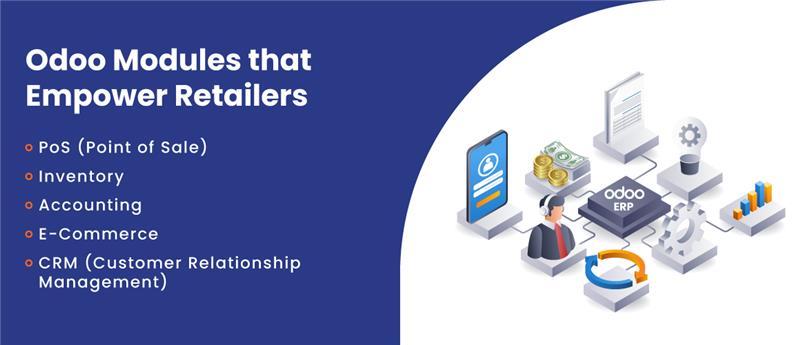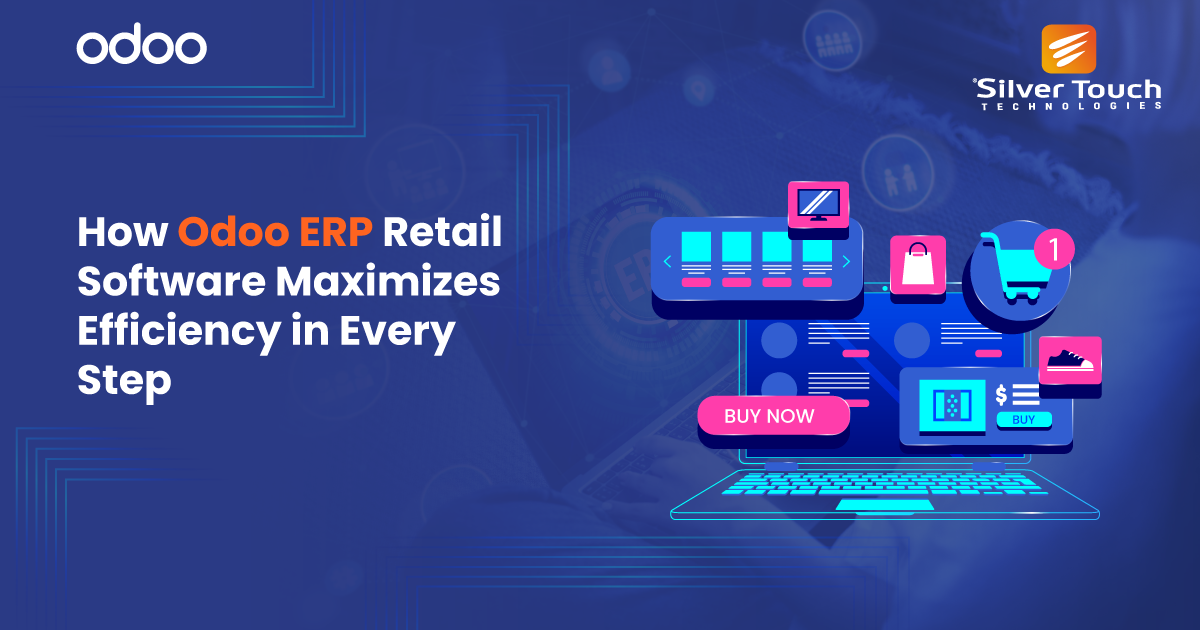The thriving retail sector poses several challenges for retailers due to changing customer demands and a complex economic scenario. These challenges can impair growth, and retailers may miss several business opportunities. Enter Odoo ERP. As an all-in-one, integrated solution, Odoo enables retailers to manage the entire process efficiently. This blog talks about the scope and benefits of Odoo for retail. Let’s start with the overview of challenges in the retail sector.
Overview of Operational Challenges in Retail Sector
The retail sector witnesses a paradigm shift towards omnichannel experiences and global supply chain volatility. As customers expect a seamless experience across multiple devices, e-commerce websites, and physical stores, retailers have to manage many aspects simultaneously. In such a scenario, maintaining inventory levels can pose a significant hurdle, and retailers struggle to maintain a balance between overstocking and stockouts.
Apart from this challenge, retailers face supply chain-related issues and strive to cope with a rapid pace of technological changes. Today, customers expect personalized shopping experiences with fast shipping and hassle-free return policies. Data challenges and last-mile delivery networks are major hurdles for retailers and decrease their efficiency. These hurdles further affect the retailer’s efforts to increase customer satisfaction.
Let’s dig deep into the role of Odoo ERP in managing all processes from inventory management to checkout in the retail sector.
Why Odoo for Retail Businesses?
Odoo, as an integrated ERP solution, plays a vital role in handling various retail processes. It connects all aspects of retail business, from inventory management to checkout. Odoo for retail is useful for automating key tasks, including replenishment of goods based on predefined reordering rules. It helps retailers avoid stockouts and overstocking. Moreover, the Odoo ERP system can track products using barcodes, lot, and serial numbers.
Another major benefit of Odoo ERP retail software is it offers an integrated POS module that retailers can fully synchronize with their inventories. This POS system can instantly update the stock count in the inventory module upon selling the product. Odoo’s POS module is capable of handling different checkout functionality, including discounts and loyalty programs. Furthermore, its offline capability keeps the sales process continuing even if there is no connectivity.
Odoo Modules that Empower Retailers
Odoo ERP retail has several modules for managing a specific part of the business. These beneficial modules include

PoS (Point of Sale)
It is the most important module for any retailer. It manages the front-end sales process, and retailers can easily apply discounts, manage returns, and accept payments through various methods. The PoS module can easily work in online and offline modes so that retailers can continue their operations even without Internet connectivity.
Inventory
The Inventory module provides retailers with real-time visibility into stock levels. It gives them the capability to monitor different warehouses and stores to prevent unwanted situations like stockouts and overstocking. The inventory module can automate key processes like replenishment and support advanced features like barcode scanning.
Accounting
This module works in integration with PoS and inventory modules. It records all financial transactions from sales and purchases automatically. It gives a real-time view of financial health in the form of profit and loss statements, balance sheets, and tax reports. It also simplifies bookkeeping and assists retailers in meeting compliance-related requirements.
CRM (Customer Relationship Management)
This is one of the most important modules for retailers. It is useful for establishing and nurturing strong relationships with customers. This module enables retailers to monitor customer interactions and manage leads. It makes it possible for retailers to offer their customers a personalized shopping experience and recommendations.
E-Commerce
It enables retailers to build and manage their online stores in line with their physical stores. It ensures that product information, pricing, and stock levels remain in sync with offline channels. This module can give a consistent experience to customers by offering a centralized order management system to retail businesses.
It is interesting to see how Odoo ERP can streamline the journey of retailers with the help of these modules.
How Odoo Streamlines the Retail Journey
Odoo for retail is a unified, all-in-one platform that connects business processes ranging from inventory to checkout. The retail journey initiates with inventory, and Odoo’s real-time monitoring function ensures accurate stock levels across multiple locations. It can automate replenishment and generate purchase orders when the stock is low. The Odoo ERP retail software supports advanced inventory features, including multi-warehouse management and barcode scanning.
Apart from managing inventory, Odoo can take care of purchase and checkout processes. When a customer makes a purchase, Odoo’s PoS module updates the inventory, sales, and accounting records simultaneously. It eliminates the necessary for manual data entry and risks related to human errors. Moreover, Odoo’s PoS module has a user-friendly interface to accelerate the checkout process for multiple payment methods.
Key Benefits of Using Odoo in Retail Sector
The biggest benefit of Odoo ERP in the retail sector is its capability to connect all aspects of a business, from inventory to POS and accounting to CRM. As a single and unified platform, Odoo ERP can eliminate the risks of data silos and human errors effectively. Moreover, it automates workflows and offers real-time data visibility across all operations in multiple locations. This contributes to increasing operational efficiency for the retail business.
Odoo also empowers retailers to make data-driven decisions. As it shows a unified view of sales, stock levels, and customer behavior, retailers can make insightful decisions. Whether it is inventory optimization or running personalized marketing campaigns, Odoo ERP is always useful for retailers. Simply put, this is a more efficient, cost-effective, and scalable solution that enables retailers to focus on improving the customer experience and driving business growth.
Concluding Remarks
A feature-rich and robust Odoo ERP retail software can effectively handle various business processes. It can reduce the chances of data discrepancies and assist retailers in making meaningful decisions in real time. This solution can drive the growth of the retail business by increasing the overall efficiency and reducing the chances of human errors. Retailers need to consider Odoo ERP integration as a key business strategy to leverage its benefits.
Silver Touch Technologies Canada is one of the best Odoo ERP Partners for retailers. Whether you own a multi-store chain or run a retail business from several locations, we assist you in growing your business with an advanced Odoo ERP retail software. Contact us to learn more about the role of Odoo for retail.
FAQs
Yes, Odoo can handle multi-store inventory management with the help of its robust inventory and multi-company features.
Odoo’s module design makes the platform customizable for handling different retail businesses. It enables users to add or remove features and configure workflows.
Yes, Odoo POS is suitable for both online and offline users as it can operate with or without an Internet connection.
Multi-store chains and retailers with businesses spanning multiple locations can benefit the most from an all-in-one, integrated solution like Odoo.



